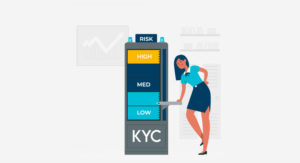What’s Next for the AML Regulation? Fraud Prevention and AML Compliance

The landscape of AML regulation is vast and diverse, and to prevent fraud the financial industry needs to keep up with the ever-changing rules and regulations. On January 1, 2021, the National Defense Authorization Act passed a new act containing a variety of defense and national security matters. This act included reforms to US anti-money laundering (AML) and counter-terrorism financing (CFT) laws.
The new developments in the AML/CFT laws will have a huge impact on the financial institutions and specific other business types. While there are a lot of changes in the AML Act, there few particular changes that financial industries need to keep their eyes on:
- Creating a non-public registry that tracks the beneficial owners of certain organizations.
- Enhancing the AML whistleblower program similar to Dodd-Frank Act’s SEC Whistleblower program.
- Expanding the US regulator’s statutory authority to ask for documents from foreign institutions.
- Increasing penalties for BSA and AML violations.
- Establishing priorities and strategies for AML policies
- Creating an annual reporting requirement to apprise Congress of all Department of Justice (DOJ) settlements including the Bank Secrecy Act (BSA).
The Current AML Landscape
Today, money laundering has reached almost every single industry and market. The scale and the impact of the pandemic are almost impossible to determine, however, the United Nations Office on Drugs and Crime (UNODC) offers an estimate that the money laundered globally is around 2-5% of the global GDP. To put that in context, the annual loss due to money laundering is about $800 billion – $2 trillion.
To reduce the global fraud loss, the Anti-Money Laundering regulations are set in place. Financial institutions have a legal obligation to monitor their clients and prevent money laundering and report any financial crime the companies detect to the right authority.
AML laws were made global after the creation of the Financial Action Task Force, the task force works as a money laundering and terrorist financing’s primary enemy. Most of the regulated markets and countries in the world have strict AML laws and regulations, failure to comply with the laws can lead to strict penalties.
There are a variety of AML regulatory bodies all over the globe, and where the business is situated determines the kind of regulatory body and the kind of international regulations they need to comply with to keep the business running. Businesses that operate within the EU must follow the 6th anti-money laundering directive.
The Future of AML Compliance
Compliance and regulation all over the world are unpredictable. Fraudsters all over the world are using cryptocurrency and multiplayer games to launder money under the noses of financial regulatory bodies. Anti-money laundering regulations are changing and covering newer markets all the time. To keep up with all the compliances and changes, businesses need to adapt to new standards and protect the businesses from regulation examination and suffering heavy penalties.
The EU recognized the need for stricter regulations on the crypto industry with the 5th AML directive. The new AML compliance stated that cryptocurrency exchanges and the custodian will have to:
- Perform CDD (Customer Due Diligence) checks as the part of Know-Your-Customer (KYC)
- Financial investigators can be authorized to obtain the addresses and identities of cryptocurrency owners which eliminates the anonymity and the risk of money laundering from the process.
- Cryptocurrency exchanges and wallet providers will need to be registered under relevant regulators in their home country.
The EU understands that the regulation of virtual currency providers and custodian wallet providers will not entirely address the issue of anonymity attached to virtual currency transactions. To efficiently fight the risks that come along with anonymity, the 5th AML directive claims that national financial institutions should be able to obtain information that allows them to associate virtual currency addresses with the identity of the owner.
Additionally, businesses must understand how to remain compliant with the AML regulations, which is now harder to do as the UK has left the EU. The UK is considered one of the most regulated countries in the world when it comes down to financial institutions. Regulations are becoming even stricter with the Anti-money laundering 6th directive which came into effect just recently.
What’s Next for AML Regulation?
Cybercrime was mentioned for the very first time in the AML 6th directive, protecting businesses against cybercrime is a tough undertaking. Using the right kind of techniques, businesses can pinpoint and tackle any potential money laundering activity.
The UK government has advised that eID verification should be the ideal method for maintaining compliance. The money laundering and terrorist funding amendment has made it clear that eID verification is one of the most effective ways to ensure compliance. Using online document verification technologies like DIRO instead of manual document and identity verification is another step that businesses need to follow to comply with the new AML directives.
Newly growing markets and modern forms of verification are becoming subject to regulation. To do everything effectively and reduce the chances of fraud, businesses need to follow all the regulatory body’s advice.
How DIRO’s Online Document Verification Can Help?
It doesn’t matter where your business is located, you do need to comply with local and international regulations, but keeping up with the ever-changing regulations is a tough task. DIRO’s online document verification can help you achieve what you want.
Our online document verification technology allows businesses to verify documents necessary for complying with AML directives. DIRO’s online document solution verifies documents instantly including the business beneficial owner information. Our API integrated buttons can improve the overall document verification process and lead to a more streamlined AML compliance across all industries.












